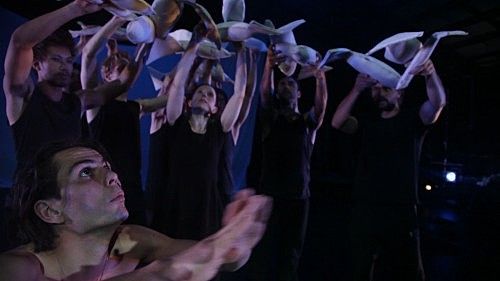Review: Sea
Red Leap Theatre’s newest show, Sea, is visually stunning but lacks narrative cohesion and emotional depth.
Best known for their 2009 masterpiece The Arrival – a stage adaptation of Shaun Tan’s gorgeous graphic novel – Red Leap Theatre’s latest show, Sea, is visually stunning but lacks narrative cohesiveness and emotional depth.
We open on the storm. Silk curtains billow fiercely down the stage, rushing towards the audience, revealing glimpses of a tragedy unfolding. As quickly as they’re there, they’re gone. We open again: an unnamed disaster has destroyed a Pacific island, but a small group have escaped and are floating adrift, hungry, tired, missing home.
Set against this backdrop of invisible catastrophe, Sea is a story of a child lost overboard. It’s about days spent trying to survive. It’s a story of a child later found (alive, thanks to some mysterious marine magic) and still more days where the end goal is to live, each minute underscored by a muddy seabed of human ruthlessness and greed.
As with Red Leap’s landmark show The Arrival, Sea is a theatre of magic, combining physicality and dance with evocative soundscapes and inventive and delightful puppetry. It’s a world to marvel at – from the plastic-bottle sea foam, to the umbrella’d jellyfish gulping upstage, to the expertly manipulated Edward Gorey-esque child-puppet clumsily learning to swim. This magic extends to the performers, too. The nine-strong ensemble cast move with a swift, magnetic energy, though it’s Dahnu Graham who’s the real highlight. Playing the lost boy, his movements evoke the weightlessness of water, the sense of being supported, yet not - that paradox of heavy grace.
There’s a difficulty you face when you don’t have dialogue (there are some spoken elements, sung or bellowed or howled, but these are mostly used to punctuate an emotion). Without it, it’s harder to create what Sea needs and lacks: narrative cohesion and emotional depth. In The Arrival, this was achieved through the exquisite simplicity of the story – a man dealing with the difficulties of immigrating to a new culture. Everything built on this single struggle. In Sea, the struggle is too vast. It wants to be too much, and in doing so becomes confusing and irresolute.
The first half of the show is a mash of shipwreck montages. There’s lots of howling and hardship. Hunger. Thirst. Betrayal. Grief. We’re presented with an extreme amplification of human fear and suffering but none of the emotional connection we need to feel it, and after a while you begin to wonder if Sea is a sly Brechtian exercise – one that forces you to focus on the magnificence of the physical performance, which you do. This doesn’t seem to be the case, though, because we move onto a brainstorm of ‘other sea issues’. Pollution. Overfishing. It’s visually spectacular but intellectually heavy-handed and, as a result, feels not only fragmented but vaguely patronising.
It’s not until the second half - when parent and child are reunited – that we witness the beating heart of the play. There’s a lot to unpack here, all of it worth unpacking: questions of how family is defined, what that means and how that can bind you, for better or worse. Leroy Lakamu is superb as the father here, cautiously yearning to find a thread that will tie him to his son. It’s these later scenes, where everything comes together, that makes the earlier ones feel like a prolonged exposition. It’s a heart that feels like it emerges a too late, beating too slowly and finishing too fast.
Sea plays at the Maidment Theatre from 6-10 March
Book tickets here
*
See also:
Johnny Givins for Theatreview | Simon Wilson for Metro
Paul Simei-Barton for The New Zealand Herald



